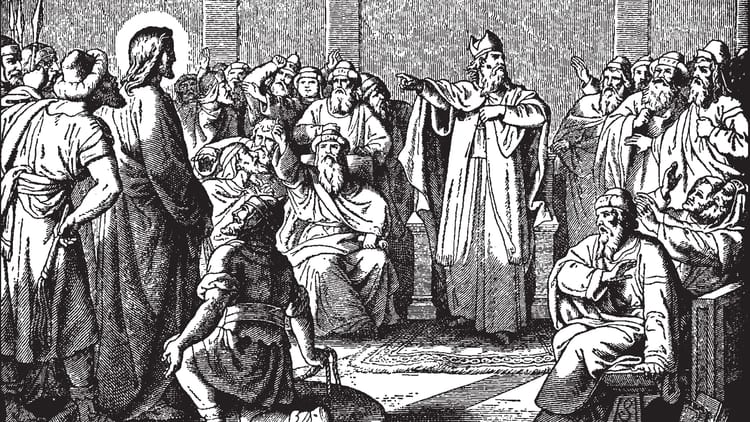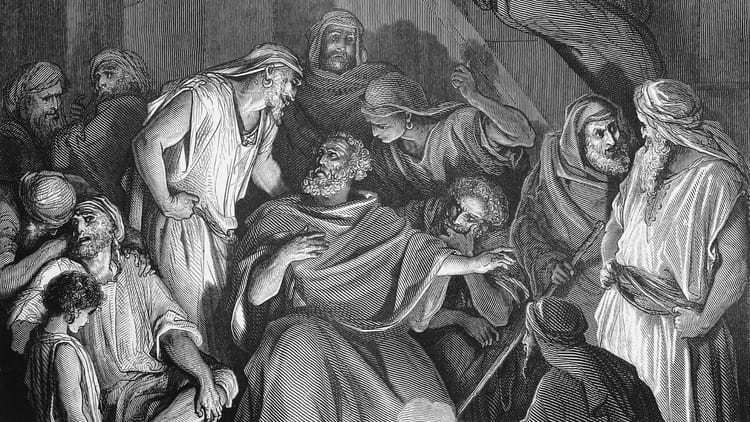Our Biggest Blind Spot (Mark 10:32-52)

When we’re young, we usually think that we’re original and unpredictable. Maybe it’s because we’re surprised by our own reactions, so we think that everyone else is as well. As we get older, we realize that our quirks and flaws no longer surprise others. The people who know you well often know what you’re going to say before you open your mouth. We’re about to say something, and the people around us can almost complete our sentence before we’ve even said anything. It’s actually kind of depressing to know that we’re that predictable.
What I’ve come to realize is that we are all fairly predictable. I don’t mean to say we never surprise. We all still do things that can surprise those around us. But the reality is that those who know us best can probably tell us what our blind spots are. They can recognize our strengths, but they are also likely to point out the areas where we might struggle.
I want to go even further this morning and suggest that there’s an area of struggle that we all have in common. I’d go so far as to say that it’s our biggest blind spot. Saying that it’s a blind spot means that it’s not only a weakness, but we’re not aware that it’s a weakness. We all have this area of struggle, and the danger is that most of us don’t even recognize it as an area of struggle. We’re not even aware of the problem, so we don’t know the danger that we’re in.
In today’s passage, Jesus turns again to the disciples and tells them what’s ahead. They’re going to Jerusalem, and you can feel the charge in the air. The disciples know that something is up. Mark 10:32 says, “They were on their way up to Jerusalem, with Jesus leading the way, and the disciples were astonished, while those who followed were afraid.” The disciples realize that something is about to unfold that will change everything. They’re excited and amazed and filled with fear as they get closer to Jerusalem.
For the third time, and in the clearest way so far, Jesus explains what’s about to happen:
Again he took the Twelve aside and told them what was going to happen to him. “We are going up to Jerusalem,” he said, “and the Son of Man will be delivered over to the chief priests and the teachers of the law. They will condemn him to death and will hand him over to the Gentiles, who will mock him and spit on him, flog him and kill him. Three days later he will rise.” (Mark 10:32-34)
Can you imagine being on the road with Jesus, getting closer to Jerusalem, and hearing this? He’s been very clear. This is the third time that he’s made this prediction. Each time the disciples have bristled as they’ve heard it. But Jesus hasn’t wavered. He’s resolute and not at all unclear about what’s going to happen. You know that you’re part of Jesus’ inner circle, and so that if all of this is going to happen to him, things aren’t going to go well for you either.
A couple of weeks ago you may have heard about a Toronto investment banker, who flew back to Toronto from Shanghai knowing that he would be arrested the minute he stepped off the airplane. Imagine if you were with him, and imagine that he told you that you would be arrested and imprisoned as his accomplice as well. You can understand why Jesus’ followers are astonished and afraid as they get closer to Jerusalem.
It’s important to notice what happens next. This is the third time that Jesus has predicted his arrest and death in Jerusalem, and the same thing happened very time. It happened at the end of chapter 8. It happened at the end of chapter 9. And it’s happening here again in chapter 10. Three times Jesus tells them what’s going to happen, and three times the disciples make the same mistake, and three times Jesus has to explain to them what the cross means for their lives. Do you think the Bible is trying to tell us something?
What’s the problem? Let’s look at today’s passage to unpack what our biggest blind spot is, and then let’s look at what this passage gives us as the antidote.
Our Biggest Blind Spot
So what’s our biggest blind spot? Do you realize that every time that Jesus tells them what lies ahead, the disciples completely fall apart? The first time, Peter takes Jesus aside to privately rebuke him. The second time they’re baffled but afraid to ask Jesus about it, and then start arguing about who is the greatest. This time, we’re going to see, two of them come and make a request of Jesus that is completely inappropriate.
So what’s our biggest blind spot? In broad terms, I think you can say that we have a hard time understanding the cross. I’m not talking about the sanitized versions of the cross that we have today – the cross necklace or the cross hanging at the front of a church. I’m not talking about singing hymns about the cross. I’m talking about the instrument of death, the means of execution. We’re very uncomfortable with the idea of Jesus – and by extension his followers – purposely going on the road knowing that what lies ahead is betrayal, condemnation, torture, and death. If you and I were told that following Jesus means that we will be signing up for a life of suffering and probably even death, we may have the same reaction as the disciples as well. We’d be baffled and afraid. We’d probably wonder what in the world we’re committing to.
Three times Jesus explains that following him means that we’re signing up for suffering and death, and three times the disciples basically say, “Does not compute.” All three times Mark shows us that the disciples have other ideas. In chapter 8, Jesus tells Peter, “You do not have in mind the concerns of God, but merely human concerns” (Mark 8:33). In chapter 9, they start arguing who is the greatest. In chapter 10, two of the disciples make a request to Jesus that shows they’re still making the same mistake.
Then James and John, the sons of Zebedee, came to him. “Teacher,” they said, “we want you to do for us whatever we ask.”
“What do you want me to do for you?” he asked.
They replied, “Let one of us sit at your right and the other at your left in your glory.” (Mark 10:35-37)
In verse 41, the others hear about this request and they’re indignant. I’m sure they were indignant because they were appalled by the audacity of James and John. But I’m sure they were also indignant because James and John had beat them to the punch. They were appalled because they had the same desire to get ahead and to occupy positions of power and glory.
Again, when the same thing happens three times in a row, do you think that Jesus and Mark are trying to tell us something? We simply don’t understand following Jesus if it means following someone to our own suffering and death. We actually have other ideas. We dream about following Jesus to positions of greater honor and greater glory. Jesus walks us to our deaths, but we keep thinking that Jesus has other ideas. We keep thinking that Jesus is leading us to our greater glory, in which everyone finally realizes who we are, and when we finally get the glory that we deserve.
I’ve been in a lot of churches, and I’ve been in a lot of meetings. I always hear people dreaming of becoming a bigger church. We’re pretty good at couching it in godly terms. We talk about doing it for God’s glory. But I’ve never been in a church meeting yet in which somebody’s said, “You know, maybe we’ve got it backwards. What if as a church we really wrestled with becoming like children who can offer nothing, like Jesus said in Mark 10. Maybe we need to work at being helpless. Maybe as a church we really need to wrestle with what Jesus said: ‘Whoever wants to become great among you must be your servant, and whoever wants to be first must be slave of all’ (Mark 10:43-44). Maybe we need to work at being a church that’s last, that becomes a servant of all.”
I was sitting in Starbucks this week and witnessed a recruiting session. The recruiter had a great business opportunity and was trying to reel the other guy in. He started dropping names of famous people he’s worked with. He pulled out a copy of Success magazine. He talked about how his income was growing to five figures a month. There was lots of talk about dreams and passions and coaching and motivational speaking. He never once said, “Let me tell you about an opportunity I can share with you. It won’t involve using any of your talents or skills, because honestly you have nothing to offer but your helplessness. It will involve you giving up positions of honor and letting everyone else go ahead of you. It will involve giving up all of your rights and becoming the last of all. And if you do it right you’ll probably get listed in Failure magazine.”
But that’s exactly what Jesus says.
Jesus called them together and said, “You know that those who are regarded as rulers of the Gentiles lord it over them, and their high officials exercise authority over them. Not so with you. Instead, whoever wants to become great among you must be your servant, and whoever wants to be first must be slave of all. (Mark 10:42-44)
So let’s review. We have a serious blind spot. Our blind spot is that we can’t really understand what Jesus is calling us to. If we’re honest, we all dream of self-advancement, of building a name for ourselves. We want a great reputation. We want to get ahead. We simply don’t understand that Jesus’ plan is the very opposite. Jesus wants us to admit our helplessness, to give up our rights. He calls us to take the very last place and become servants of all. He calls us to give up everything and follow him. He wants us to become servants. And as somebody has said, “You can tell whether you are becoming a servant by how you act when people treat you like one.” We probably agree with Plato a lot more than Jesus. Plato said, “How can anyone be happy when he is the slave of anyone else at all?” Our blind spot is that we’re a lot more likely to agree with Plato than we are with Jesus. We’re a lot more comfortable being on top than being servants. We want Jesus but without his cross.
The Question
There’s a question in this passage that can help us as we wrestle with this blind spot. Imagine if Jesus asked you this question this morning. Verse 36: “‘What do you want me to do for you?’ he asked.” Imagine if Jesus asked you this question and you could say anything. What would you answer Jesus if he asked you, “What do you want me to do for you?”
Maybe our answer would be similar to that of James and John. “Let one of us sit at your right and the other at your left in your glory” (Mark 10:37). They were asking to become Jesus’ right-hand and left-hand men. They wanted to rise to the top. Maybe that’s a little like what most of us would ask for if Jesus asked us, “What do you want me to do for you?”
But there’s another way to answer this question. In verses 46 to 52 we come across a blind beggar. He’s got nothing. The crowd has no time for him. He’s got nothing to offer and no visions of grandeur. He’s even excluded from worship in the temple. But he recognizes Jesus and calls on him as the Son of David – a Messianic title – and simply pleads for mercy. He’s the least likely disciple. Jesus says in verse 51, “What do you want me to do for you?” He simply answers, “Rabbi, I want to see.” And as soon as Jesus heals him, he follows Jesus on the road. The reader knows where that road is going. A disciple, Mark is telling us, is someone who knows that he or she is blind, and who simply wants Jesus to grant eyesight so that we can follow him on the road wherever it leads.
How do we get there? We get there by understanding that this is the path Jesus himself took. This is the path that he calls us to take, because it’s the path that God himself took for our sake.
For even the Son of Man did not come to be served, but to serve, and to give his life as a ransom for many. (Mark 10:45)
This is the clearest Jesus gets in explaining his purpose. Jesus did not come to achieve a position of greatness. He abandoned a position of greatness so that he could take the lowest place. He came to die to pay the price of freedom so that we could be set free. As Jonathan Edwards put it:
He suffered, that we might be delivered. His soul was exceeding sorrowful, even unto death, to take away the sting of sorrow, and to impart everlasting consolation. He was oppressed and afflicted, that we might be supported. He was overwhelmed in the darkness of death, that we might have the light of life. He was cast into the furnace of God’s wrath, that we might drink of the rivers of his pleasures. His soul was overwhelmed with a flood of sorrow, that our hearts might be overwhelmed with a flood of eternal joy.
In 1700, a man was born into incredible power and wealth. His name was Nicolaus Ludwig von Zinzendorf, or Count von Zinzendorf for short. He was a German nobleman and could expect to live a life of privilege and a career as a diplomat and landowner.
Zinzendorf pretty much ended up spending his wealth down to zero doing good deeds, pouring himself out for others. Why? What happened to him?
He was sent as a young man to visit the capital cities of Europe in order to complete his education. One day he found himself in the art gallery in Dusseldorf. He saw a painting by Domenico Feti entitled “Ecce Homo” (“Behold the Man”). It was a portrait of Christ before Pilate with the crown of thorns pressed down on his head and blood running down his face. It was very moving for Zinzendorf.
Underneath the painting, the artist had penned an inscription. It was the words of Jesus, and the words were: “All this I did for thee; what doest thou for me?” It shook Zinzendorf to the roots. Later on he said, “Then and there I asked Jesus Christ to draw me into the fellowship of his sufferings, and to open up a life of service for me.” He did, and he will.
Father, we see this morning that we are prone to get it all wrong. We have a hard time with the cross. We tend to seek our own glory. We want to be first.
But that’s not the way of the cross. We serve a Savior who gave up his place of power and privilege, and who became a servant. You call us to follow him. As 1 John 3:16 tells us, “Jesus Christ laid down his life for us. And we ought to lay down our lives for one another.”
May we see what Jesus has done on the cross, and as a result may we become servants of all, content to be last. In Jesus name, Amen.





